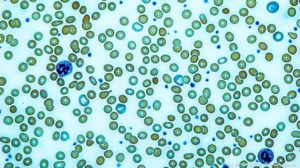 A study supported by the NIHR Oxford Biomedical Research Centre has concluded that iron supplements on their own are not enough to efficiently tackle anaemia in places with high infection burdens.
A study supported by the NIHR Oxford Biomedical Research Centre has concluded that iron supplements on their own are not enough to efficiently tackle anaemia in places with high infection burdens.
In a paper published in The BMJ, Prof Hal Drakesmith from the MRC Human Immunology Unit, based at Oxford’s John Radcliffe Hospital, and collaborators in Australia and Gambia provide a cross-disciplinary synthesis of data from fields of infection, haematology, nutrition and global health to address the problem of anaemia.
Their analysis shows that in countries where there is a high infection burden, for example from malaria or intestinal pathogens, providing iron supplements may increase patient susceptibility to infection, and often does not improve anaemia.
This is particularly important because the majority of young children affected by anaemia live in sub-Saharan Africa and Asia, areas where many of these infections are endemic.
Anaemia affects 273 million children and 529 million women globally. Prevalence in children under the age of five is highest in sub-Saharan Africa (62.3%) and South-East Asia (53.8%). Iron is an essential micronutrient required for many biological processes, and iron deficiency can compromise diverse physiological functions and commonly leads to anaemia.
As a result, public health strategies to control anaemia have emphasised iron replenishment, and focused on strategies such as fortifying food with iron and universal distribution of iron supplements.
However, as the study points out, the prevalence of anaemia across the developing world has not markedly improved despite decades of nutritional programmes focused on iron supplements.
“The mechanistic work we do in the lab, and our collaborations with MRC Gambia, have shown at a molecular level how infections and inflammation prevent absorption of dietary iron,” Prof Drakesmith said.
“This has given us some insight into why anaemia rates across the developing world have been persistently very high for so long despite huge efforts by aid agencies. Unless we emphasize the fight against infection, we fear anaemia will continue to be a huge global health problem.”
As well as the NIHR Oxford Biomedical Research Centre’s Haematology Theme, this research was funded by the Medical Research Council.